WordPress vs Framer: Final verdict
Wordpress and Framer both offer unique strengths, making them suitable for different types of users and projects.
WordPress (Overall Grade: 7.1/10)
is a versatile open-source CMS that excels in customization and flexibility. It is ideal for users who need extensive control over their website’s design and functionality, supported by a vast array of plugins and themes. WordPress is particularly strong in ecommerce through WooCommerce, making it a robust choice for online stores. However, it requires separate hosting and domain services, which can add to the complexity for beginners.
Framer (Overall Grade: 7.1/10)
stands out with its AI-driven design capabilities and user-friendly interface, catering to both novice and experienced designers. It offers a comprehensive component library and real-time collaboration features, making it ideal for dynamic and interactive web experiences. While Framer lacks native ecommerce features and has a steeper learning curve for beginners, its built-in AI tools and structured pricing plans make it a compelling choice for creative projects and teams.

|

|
|
|---|---|---|
Design functionalities & templates |
9.0 |
8.5 |
Ease of use |
7.2 |
7.1 |
Ecommerce |
8.4 |
5.9 |
Website Editors |
8.5 |
7.6 |
Product testing options |
8.1 |
6.2 |
Price |
5.9 |
7.7 |
Hosting quality |
0 |
7.1 |
Website speed optimization |
6.5 |
7.4 |
Plugins and integrations |
8.8 |
7.6 |
Marketing features |
8.0 |
7.2 |
Customer support |
5.0 |
5.6 |
Security |
6.7 |
8.2 |
AI capabilities |
6.1 |
7.6 |
User Management |
8.8 |
7.4 |
Which one is the best for ecommerce: WordPress or Framer?
 8.4
8.4
 5.9
5.9
Verdict
: WordPress is a more robust option for ecommerce due to its extensive features and flexibility, while Framer is more limited and relies on third-party integrations.
Wordpress
: With the WooCommerce plugin, WordPress offers a comprehensive ecommerce solution. It supports multiple payment gateways, abandoned cart recovery, and detailed ecommerce analytics. When comparing WordPress vs Framer, WordPress stands out for its extensive plugin ecosystem and SEO optimization tools, making it ideal for businesses looking for a scalable and customizable ecommerce platform.
Framer
: Framer lacks native ecommerce features and relies on integrations like Ecwid for ecommerce functionality. While it offers a user-friendly design interface and AI-driven tools, it falls short in providing the depth of ecommerce features that WordPress offers. Framer is more suited for simpler ecommerce needs and smaller projects.
Which one is the best for informational and business websites?
 9.2
9.2
 7.5
7.5
Verdict
: When it comes to creating informational and business websites, WordPress stands out as the superior choice due to its extensive customization options and robust support network. Framer, while innovative and user-friendly, is better suited for design-focused projects and may present a learning curve for beginners.
Wordpress
: WordPress excels in providing a highly customizable platform with a vast array of themes and plugins, making it ideal for a wide range of informational and business websites. Its open-source nature allows for extensive creative freedom, and its strong community support ensures that users have access to a wealth of resources and assistance. With a score of 9.2, WordPress is particularly well-suited for users who need full control over their website’s design and functionality.
Framer
: Framer offers a modern, AI-driven design interface that is perfect for users looking to create dynamic and engaging web experiences. It provides a comprehensive component library and real-time collaboration features, making it a great choice for design teams and developers. However, with a score of 7.5, Framer may not be as suitable for beginners or those looking for a straightforward website builder for informational purposes. Its advanced features and focus on high-fidelity prototypes can present a learning curve for new users.
WordPress vs Framer: Detailed comparison
Design functionalities & templates
Design FunctionalitiesRepresents how well each platform allows for creative design and customization of websites.Score Components:
- Template Variety (30%): Range and quality of design templates.
- Customization (30%): Flexibility and options for design alterations.
- User Interface (20%): Ease and intuitiveness of the design process.
- Responsiveness (10%): Adaptability to different devices and screen sizes.
- Innovation (10%): Unique design features and tools.
 9.0
9.0
 8.5
8.5
🏆
Winner: WordPress.
If you’re looking for a platform that offers more creative control and a wide array of design features, WordPress is the preferred choice.
WordPress offers an extensive variety of templates and designs, catering to a wide range of website types beyond just blogs or ecommerce. Its open-source nature allows for high customization and creative freedom, appealing to diverse user needs. While WordPress itself doesn’t sell premium templates, numerous third-party theme shops offer sophisticated and specialized design choices, expanding the possibilities for users.
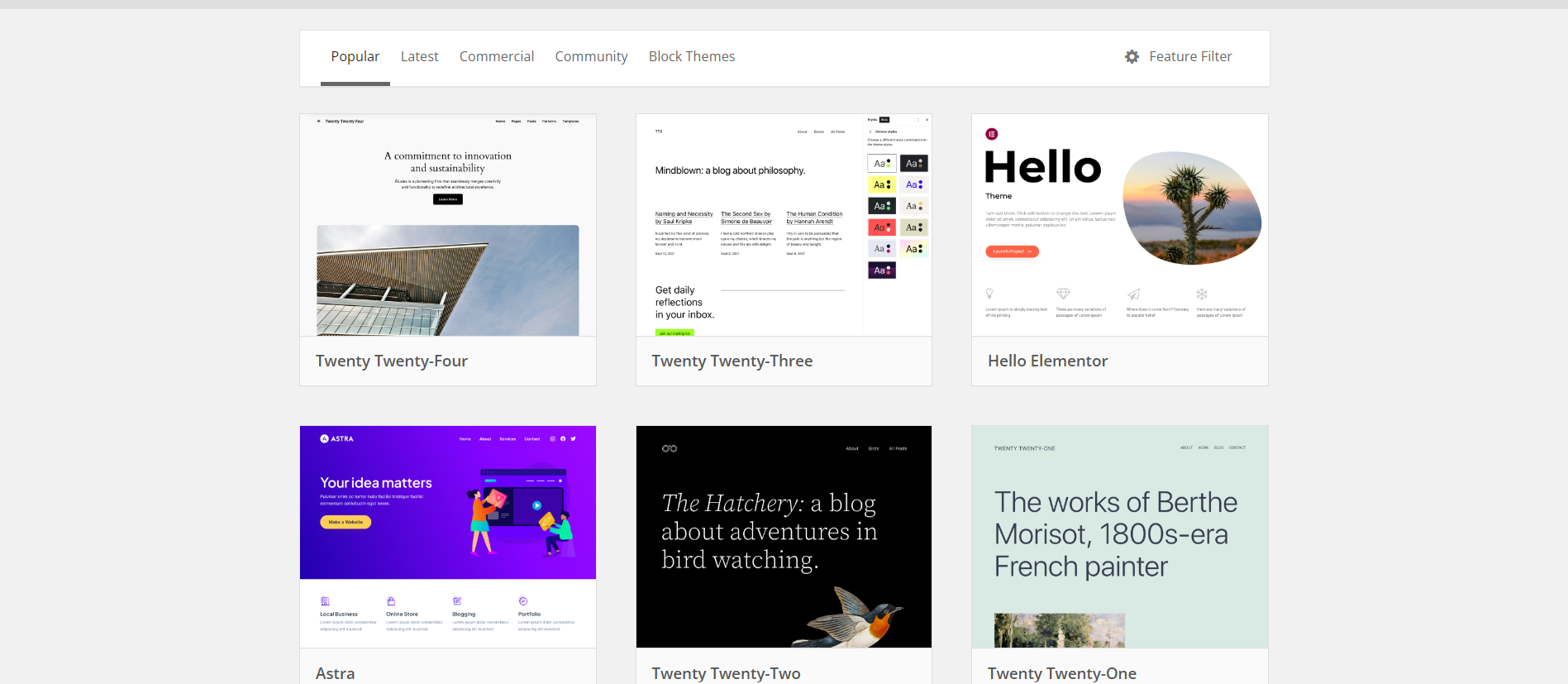
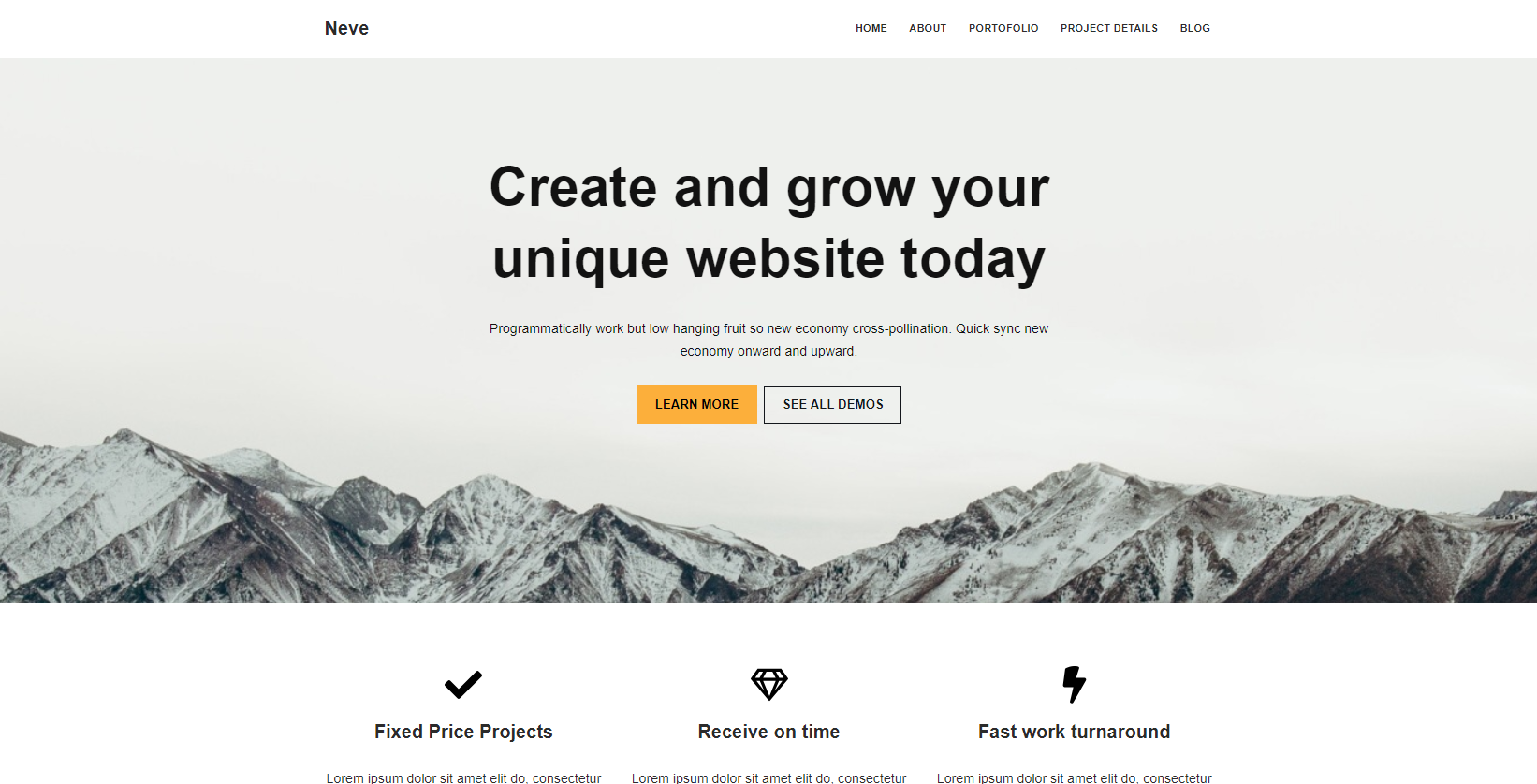
Compared to WordPress, Framer offers a diverse array of over 1,000 customizable website templates and designs, catering to various industries and project requirements. It stands out for its robust design and prototyping features, including responsive design capabilities, real-time collaboration, and extensive import options from other design tools. The platform facilitates a collaborative design process through features like multiplayer functionalities and real components for interactive design, making it an ideal choice for designers, developers, and teams.
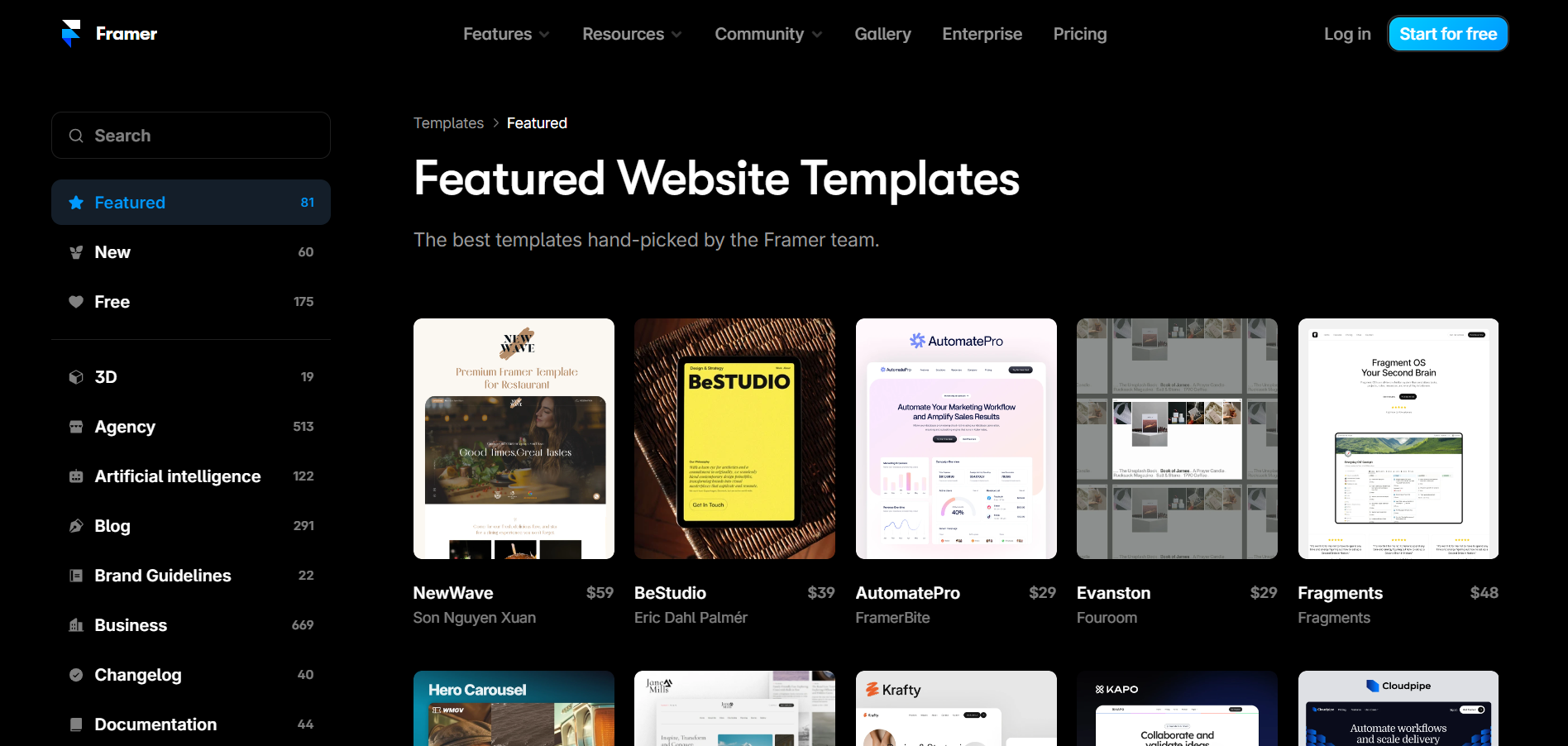

Get a head start on website creation with AI
Create a custom website tailored to your business needs 10X faster with 10Web AI Website Builder!
Ease of use
Ease of useReflects the platform’s overall user-friendliness.Score
Components:
- Learning curve (40%): Quickness and ease of getting started.
- Interface design (30%): Simplicity and intuitiveness of layout.
- User guidance (20%): Quality of tutorials and support.
- Flexibility (10%): Adaptability to various user skills.
 7.2
7.2
 7.1
7.1
🏆 Winner: WordPress
. With a score of 7.2, WordPress edges out Framer, which scored 7.1. While both platforms offer extensive customization options, WordPress is more suitable for those who desire full control over their website’s design and functionality. Framer, on the other hand, is more appealing for users interested in creating dynamic and engaging web experiences, but it may present a learning curve for complete beginners due to its advanced animation and interaction features.
Learning Resources
🏆 Winner: WordPress
. Both platforms offer a wide range of learning resources, but WordPress stands out with its vast array of detailed documentation, community forums, online tutorials, and courses. Framer also offers detailed courses and lessons on Framer Academy, but WordPress’s extensive support network is beneficial for users of all skill levels.
For ecommerce
EcommerceMeasures the platform’s effectiveness in supporting online business activities.Score Components:
- Ecommerce themes and templates (20%): Variety and design of templates.
- Product management (25%): Ease of managing and organizing products.
- Payment options (25%): Variety and convenience of payment methods.
- Ecommerce features (20%): Features for managing an ecommerce store.
- Integration (10%): Compatibility with external e-commerce tools and services.
 8.4
8.4
 5.9
5.9
When it comes to ecommerce, WordPress and Framer offer different approaches. WordPress, through the WooCommerce plugin, provides a comprehensive ecommerce solution with features like multiple payment gateway support, abandoned cart recovery, ecommerce analytics, and SEO optimization tools. Framer, on the other hand, lacks native ecommerce features and relies on the integration with Ecwid’s free shopping cart extension for ecommerce functionality.
 |
 |
|
|---|---|---|
Ecommerce themes and templates |
9.2 |
7.0 |
Product page customization |
9.0 |
5.5 |
Payment processing and commissions |
7.5 |
6.5 |
POS capabilities |
6.5 |
3.0 |
Payment gateways |
8.5 |
6.0 |
Product numbers |
7.0 |
6.0 |
Additional ecommerce features |
8.0 |
5.5 |
WordPress ecommerce features:
- WooCommerce Integration
- Multiple Payment Gateway Support
- Abandoned Cart Recovery
- Ecommerce Analytics
- SEO Optimization Tools
- Extensive Plugin Ecosystem
Framer ecommerce features:
- Ecwid integration
Ecommerce themes & templates
WordPress offers hundreds to potentially thousands of ecommerce and WooCommerce specific themes and templates, both free and premium. Framer provides 97 website templates specifically designed for ecommerce. These templates are highly customizable, allowing for easy adjustments to colors, fonts, layouts, and integration with essential ecommerce tools.
Product page customization
WooCommerce on WordPress offers extensive customization for ecommerce product pages, including product images, descriptions, add-to-cart buttons, product tabs, upsells, and related products. Framer, however, primarily focuses on design possibilities and lacks inherent ecommerce functionalities. It heavily depends on integrating with platforms such as Shopify and Ecwid for ecommerce features.
Payment processing
WordPress doesn’t handle payments directly but offers plugin options for payment processing, including popular gateways like PayPal, Stripe, Authorize.Net, and Square. Framer supports Stripe for payment processing, enabling a wide range of payment options including one-time payments, subscriptions, and more, without requiring coding.
However, Framer’s focus is on online transactions and ecommerce integrations, and there’s no explicit mention of native POS functionality. For the most current details on fees and features, it’s recommended to consult directly with Framer or Stripe.
Website Editors
Website EditorsEvaluates the platforms’ website building and editing capabilities.Score Components:
- Customization tools (40%): Range and power of editing features.
- Editor usability (30%): User experience within the editor.
- Design flexibility (20%): Freedom in layout and design changes.
- Update and maintenance ease (10%): Simplicity of updating and maintaining the site.
 8.5
8.5
 7.6
7.6
🏆
Winner: WordPress
. WordPress, with a score of 8.5, offers a user-friendly interface with block-based editing, extensive styles customization, template management, page editing/creation, distraction-free modes, versatile saving options, and accessibility for users of varying skill levels.
It provides a WYSIWYG (What You See Is What You Get) interface, with a Design panel on the left and a live preview on the right. You can edit styles, manage templates and pages, and use various blocks for customization. Changes can be applied globally, including Header and Footer templates. The editor also offers features like undo/redo, List View, Command Palette, and customization tools.
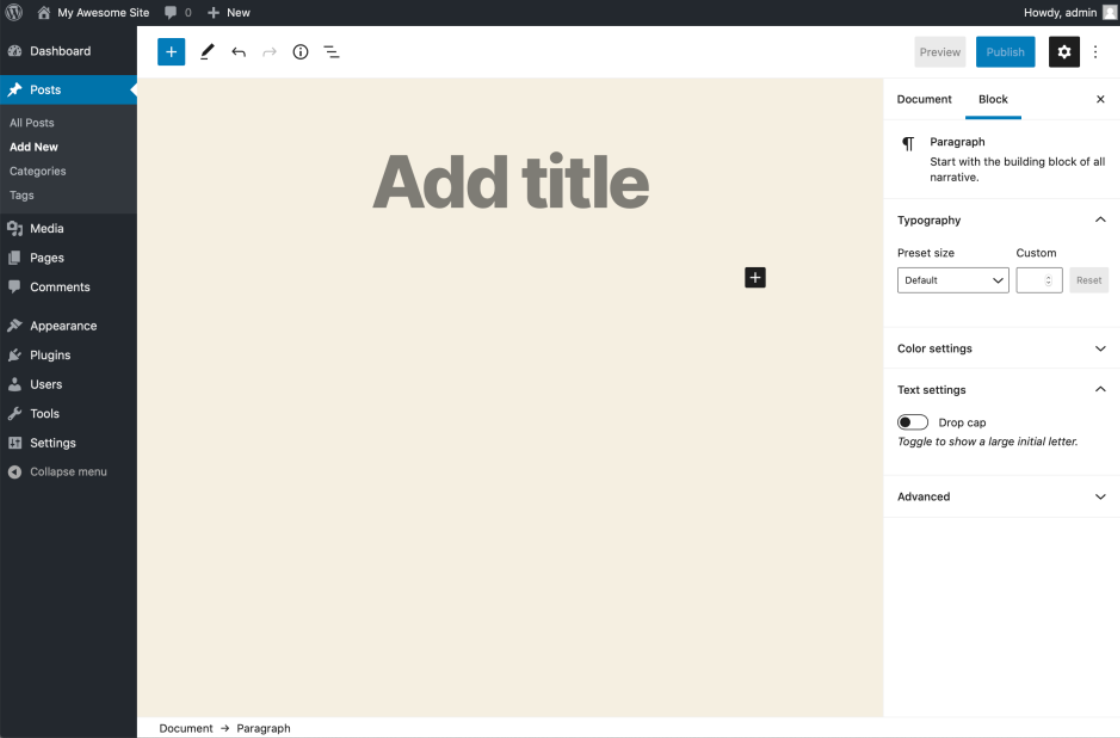
Framer’s website builder editor, scoring 7.6, is designed for high-fidelity prototyping and complex animations, catering to both designers and developers. It offers a robust set of tools for creating interactive and responsive designs, including a wide array of pre-built components, real-time collaboration features, and the ability to integrate with other design tools and workflows.
However, its advanced features and focus on high-fidelity prototypes may present a steep learning curve for beginners or those accustomed to more traditional, straightforward website builders.
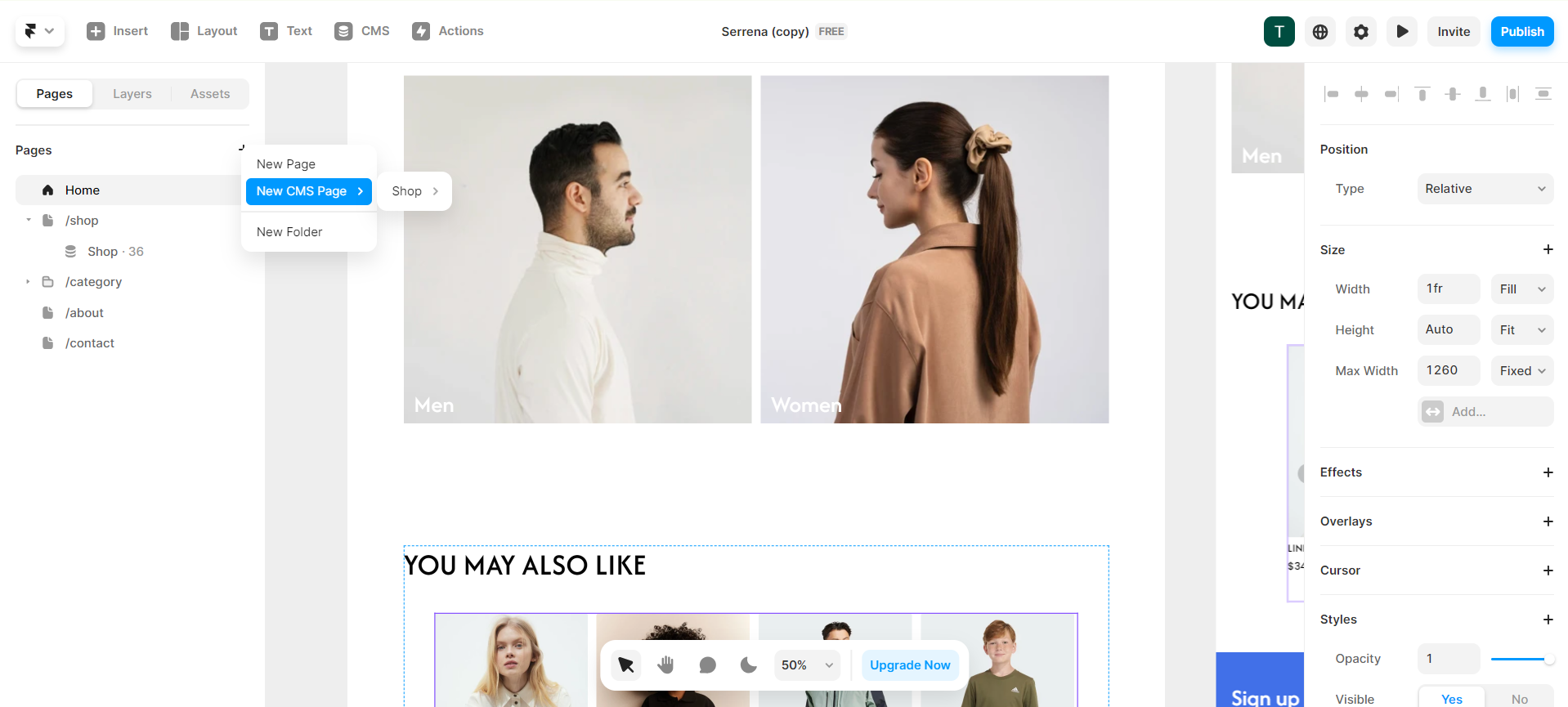
Mobile editor/app
 8.1
8.1
 4.5
4.5
🏆
Winner: WordPress
. Both WordPress and Framer offer mobile editing capabilities, but they cater to different needs and skill levels. WordPress has a dedicated mobile app that allows users to manage their website on the go. You can create and edit posts, manage comments, schedule content, and analyze website traffic from your phone or tablet.
While it offers convenience and basic functionality, it has some limitations compared to the web-based editor, including fewer advanced options, restricted code access, and limited design customization.
Framer, on the other hand, does not have a dedicated mobile app. Users have to use a mobile browser to make changes to their website, which is notably inconvenient and comes with certain restrictions. Therefore, WordPress is the clear winner in this category due to its dedicated mobile app and the convenience it offers to users.
In summary, WordPress receives a higher rating due to its dedicated mobile app and the convenience it offers, while Framer is lacking in this area and may be better suited for users who are comfortable with mobile browser editing.
Product testing options
Product Testing OptionsAssesses the options for trying out platform features before commitment.Score Components:
- Trial quality (40%): Extent and usefulness of the trial or free version.
- Feature accessibility (30%): How many features are available to test.
- Trial duration (20%): Length of the trial period.
- Ease of transition (10%): Smoothness of moving from trial to paid plans.
 8.1
8.1
 6.2
6.2
Overall Result
:
Wordpress wins
. WordPress scores 8.1 in product testing options, while Framer scores 6.2. WordPress, being an open-source CMS, offers a free version with no trial period or premium feature testing. On the other hand, Framer offers a free version and allows testing of some premium features. However, it does not offer a trial version. The money-back guarantee is not applicable for WordPress as it is a free, open-source platform, while Framer offers a money-back guarantee only in some regions.
 |
 |
|
|---|---|---|
Free Plan |
Yes (open source software) |
Yes |
Trial Duration |
No | No |
Testing Premium Features |
No | Possible with free version |
Money Back Guarantee |
Not applicable | Only in some regions |
Price
PriceLooks at the cost-effectiveness and value for money of each platform.Score Components:
- Plan value (40%): What each pricing tier offers.
- Transparency and clarity (30%): Clearness of pricing structures.
- Flexibility of plans (20%): Range of options to suit different budgets.
- Hidden costs (10%): Additional expenses not included in the plan.
 5.9
5.9
 7.7
7.7
Framer offers a more structured pricing model with various plans to suit different needs, while WordPress is free but requires separate purchases for hosting and domain services.

|

|
|
|---|---|---|
Free |
Free Plan ($0/month): WordPress is open source software that is free. WordPress does not provide hosting services; so, it is necessary to purchase a domain, web hosting, and website builder subscriptions separately. While WordPress lacks built-in ecommerce, plugins like WooCommerce offer a solution. WordPress offers an extensive variety of templates and designs. WordPress lacks a built-in AI-assisted builder, but its open-source nature allows for an ecosystem of plugins and themes incorporating AI for website building. |
Free (Free/month): Allows 3 websites built on a framer.website subdomain with Framer branding in the footer. Limited to 1,000 traffic visitors and 1,000 CMS items. |
$0-$10 |
No offering at this amount. |
Mini ($10/month): Removes Framer branding, allows using a custom domain, includes collaboration with an additional cost for extra editors, custom code embedding, e-commerce support, and limited CMS items. Offers a monthly visitor limit of 2,000 and 1GB bandwidth. Value for price: 6.5 |
$10-$20 |
No offering at this amount. |
Basic ($20/month): Offers all Mini features plus increased limits for CMS items (1,000) and traffic (10,000 visitors per month), along with 10GB bandwidth. Value for price: 7.5 |
$30+ |
No offering at this amount. |
Pro ($30/month): Enhances Basic plan features with a significant increase in CMS items (10,000), traffic (100,000 visitors per month), and bandwidth (100GB), among other advanced features. Value for price: 8.5 |
location. As a result in rare cases the prices displayed here can differ from the ones you see on their
websites.
Hosting quality
Hosting
qualityExamines the reliability and performance of the hosting solutions.Score Components:
- Uptime (40%): Consistency and reliability of website availability.
- Speed (30%): Loading times and performance.
- Bandwidth and storage (20%): Sufficiency of resources provided.
- Data centers (10%): Quality and distribution of hosting infrastructure.
 0
0
 7.1
7.1
🏆
Winner: Framer
Framer offers hosting included in all their plans, with a 99.9% uptime and data centers in the US, Ireland, and Singapore. On the other hand, WordPress does not directly provide hosting services, so its hosting quality is dependent on the chosen hosting provider.
 |
 |
|
|---|---|---|
Do they offer hosting? |
No | Yes, included in all plans |
Data Centers: |
Depends on hosting provider | 4 globally: 2 in US, 1 in Ireland, 1 in Singapore |
Type of hosting: |
Depends on hosting provider | Cloud Hosting |
Uptime: |
Depends on hosting provider | 99.9% |
Uptime Guarantee: |
Depends on hosting provider | Only for enterprise plan, 99.99% |
Website Speed Optimization
Website Speed OptimizationEvaluates optimization of website loading timesScore Components:
- PageSpeed Score (30%): Google’s score indicating performance optimization.
- Loading Time (30%): The average time until a website is fully interactive.
- Mobile Optimization (15%): Optimization effectiveness for mobile devices.
- Resource Optimization (15%): Optimizing images, scripts, and other heavy resources.
- CDN Usage (10%): Use of CDN to enhance speed across geolocations.
 6.5
6.5
 7.4
7.4
🏆 Winner: Framer
Both WordPress and Framer place a high priority on website performance and page speed, with Framer focusing on code minification, pre-rendering, caching, and image optimization, and WordPress providing valuable resources for enhancing website’s Core Web Vitals (CWV). However, Framer gets a slight edge when it comes to website speed optimization.
 |
 |
|
|---|---|---|
Focus |
Core Web Vitals, WP Rocket, Hummingbird |
Code Minification, Pre-Rendering, Caching |
Performance Tools |
Google Lighthouse, PageSpeed Insights |
Google PageSpeed Insights Integration |
Key Strategies |
Analyze CWV, choose a reliable host, optimize images, minimize plugins, use lazy loading, employ a CDN |
Code Minification, Pre-Rendering, Caching, Image optimization |
Load Times |
Varies widely, dependent on optimization |
Varies depending on optimization and website complexity |
Page Speed Scores Range |
Scores vary; influenced by apps, images |
Varies depending on optimization and website complexity |
Core Web Vitals Improvement |
Analyze CWV, choose a reliable host, optimize images, minimize plugins, use lazy loading, employ a CDN |
Emphasis on LCP, FID, CLS improvements |
WordPress, an open-source content management system, provides valuable resources for enhancing website’s Core Web Vitals (CWV). It suggests analyzing CWV, choosing a reliable host, optimizing images, minimizing plugins, using lazy loading, and employing a CDN. Tools like Core Web Vitals, WP Rocket, Hummingbird are recommended, and AMP is considered for mobile speed. However, the load times and PageSpeed scores vary widely, depending on optimization.
Framer, on the other hand, focuses on code minification, pre-rendering, caching, and image optimization for website speed optimization. It emphasizes on LCP, FID, CLS improvements for Core Web Vitals. However, the load times and PageSpeed scores vary depending on optimization and website complexity. Despite this, Framer’s approach to website speed optimization gives it a slight edge over WordPress.
Get a head start on website creation with AI
Create a custom website tailored to your business needs 10X faster with 10Web AI Website Builder!
Plugins and integrations
Plugins and integrationsMeasures the range and effectiveness of additional plugins and integrations.Score Components:
- Variety of options (40%): Range of available add-ons.
- Integration smoothness (30%): Ease of integrating plugins into the site.
- Quality of plugins (20%): Functionality and reliability of the options.
- Custom integration capabilities (10%): Support for custom or third-party integrations.
 8.8
8.8
 7.6
7.6
🏆 Winner: WordPress.
With a score of 8.8, WordPress leads in plugins and integrations. It offers over 60,000 free plugins, extending its functionality across various domains like ecommerce, SEO, social media, and more. Framer, scoring 7.6, also provides a variety of plugins catering to different needs, but falls short in comparison to the extensive offerings of WordPress.
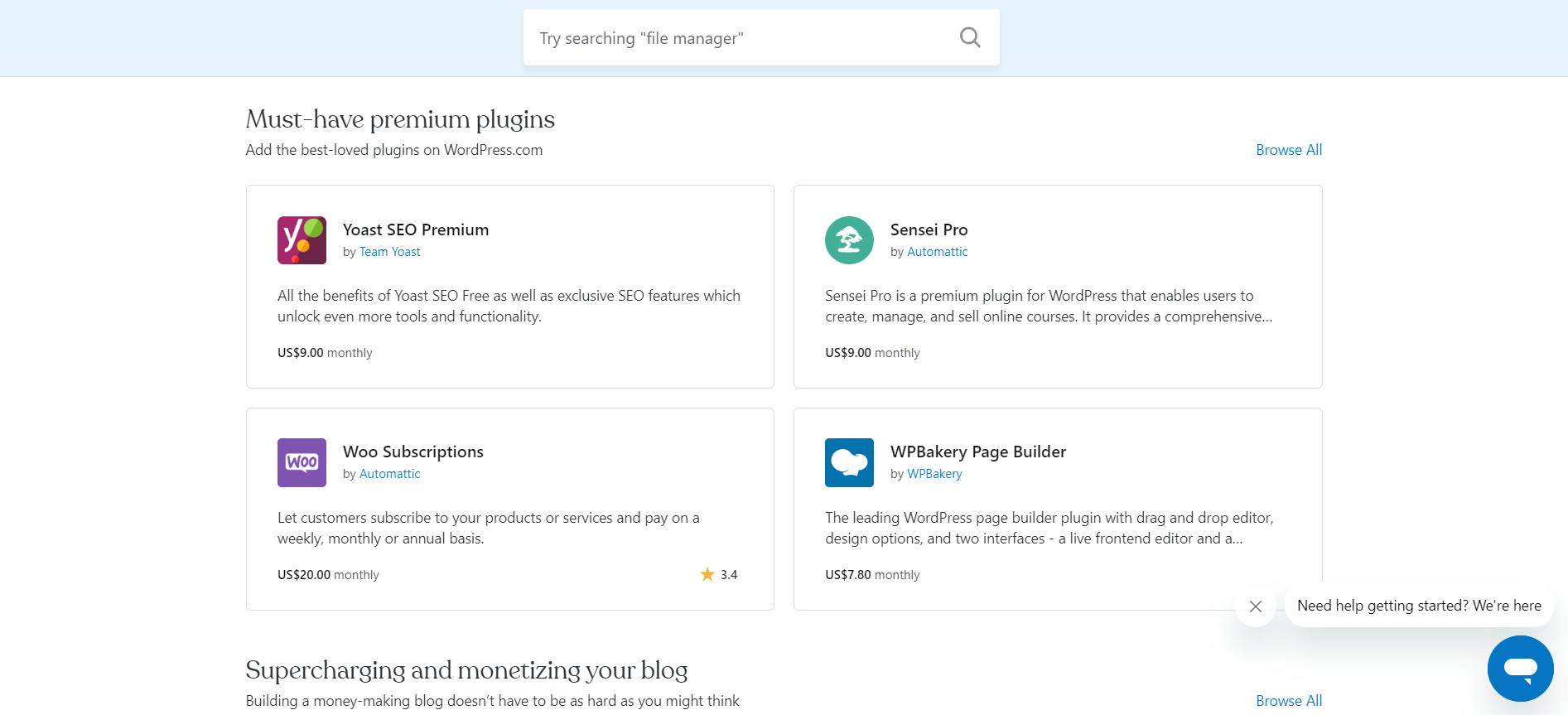
Marketing Features
Design FunctionalitiesRepresents how well each platform allows for creative design and customization of websites.Score Components:
- Template Variety (30%): Range and quality of design templates.
- Customization (30%): Flexibility and options for design alterations.
- User Interface (20%): Ease and intuitiveness of the design process.
- Responsiveness (10%): Adaptability to different devices and screen sizes.
- Innovation (10%): Unique design features and tools.
 8.0
8.0
 7.2
7.2
🏆
Overall Winner: WordPress
. WordPress stands out for its extensive customization options through plugins, making it suitable for a wide range of marketing activities. Framer, while offering a good range of features, lacks in ads and promotions capabilities.
 |
 |
|
|---|---|---|
SEO Tools |
||
Email Marketing |
✓ (through plugins) |
✓ (through Mailchimp integration) |
Blogging |
||
Social Media Integration |
Plugins for direct linking, automatic posting, and social feeds display |
|
Analytics and Reporting |
In-depth analysis via plugins like Google Analytics for WordPress |
Yes, only on higher plans |
Ads and Promotions |
Support for Google Ads and ad management through various plugins |
No |
Customer Support
Customer supportEvaluates the quality and availability of support options.Score Components:
- Response time (40%): Speed of support responses.
- Support quality (30%): Effectiveness and helpfulness of the support.
- Availability (20%): Range of support channels (phone, chat, email).
- Resource richness (10%): Quality of self-help and educational materials.
 5.0
5.0
 5.6
5.6
🏆 Winner: Framer
. In the comparison of WordPress vs Framer, Framer edges out with a slightly higher customer support score of 5.6 compared to WordPress’s 5.0. Framer offers a community forum, a knowledge base, and email support, providing users with multiple avenues to seek help. Although details about their support hours are not specified, the availability of these resources ensures users can find assistance when needed.
WordPress, being an open-source CMS, does not have a dedicated support team. Users rely on community forums, the WordPress codex, and support from hosting providers or plugin and theme developers. While this decentralized support system can be effective, it may not provide the immediate assistance some users require, especially those new to the platform.
Security
SecurityLooks at the platforms’ security measures and data protection.Score Components:
- Data protection (40%): Safeguards for user and customer data.
- SSL and encryption (30%): Implementation of secure connections.
- Compliance (20%): Adherence to industry security standards.
- Regular updates (10%): Frequency of security updates and patches.
 6.7
6.7
 8.2
8.2
🏆
Winner: Framer
. Framer takes a comprehensive approach to security, with data encryption, secure development practices, and strict organizational security policies. They utilize Amazon Web Services (AWS) for hosting, ensuring data is encrypted at rest. Access to secrets and keys is restricted based on the principle of least privilege, and environments are fully separated and isolated for additional security.
WordPress, being an open-source platform, offers a variety of plugins to enhance security. However, the actual security measures can vary depending on the hosting provider. Despite this, WordPress provides numerous functionalities and resources to enhance website security effectively, such as site backups, monitoring, malware scanning, user activity tracking, permission control, and spam protection tools.
AI Capabilities
AI capabilitiesMeasures the effectiveness of AI-driven features and tools.Score Components:
- Automation efficiency (40%): Impact of AI on streamlining processes.
- Personalization (30%): AI-driven customization for users or customers.
- AI-Assisted design (20%): Role of AI in website design and functionality.
- Data analysis (10%): Use of AI in interpreting user data and analytics.
 6.1
6.1
 7.6
7.6
 |
 |
|
|---|---|---|
AI Builder |
Lacks built-in AI builder, relies on plugins |
Built-in AI builder for content creation and optimization |
AI Ecommerce features |
Lacks built-in AI ecommerce features, relies on plugins |
Does not have any AI ecommerce features |
AI Content Generation |
Lacks built-in AI content generation, relies on plugins |
AI tools for content generation and localization |
Additional AI features |
Wide range of AI powered plugins and tools |
AI Style and AI Photo Generating and Editing tools |
🏆 Winner: Framer
. Framer, with a score of 7.6, has built-in AI capabilities that enhance the website creation process. Its AI tools for content generation and localization, along with additional features like AI Style and AI Photo Generating and Editing tools, make it a more comprehensive solution for AI-assisted website building.
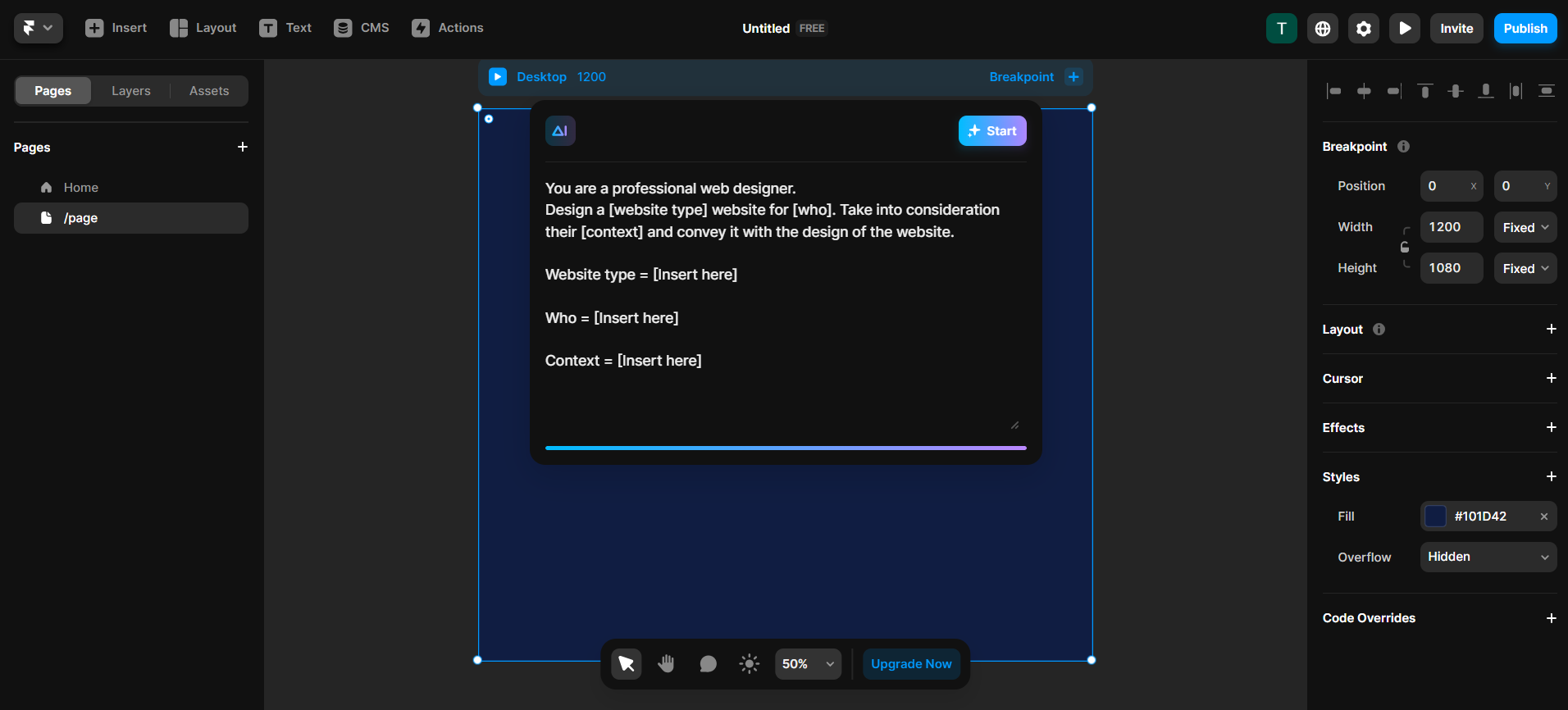
WordPress, with a score of 6.1, does not have built-in AI capabilities. However, its open-source nature allows for the integration of a wide range of AI plugins and tools, making it a flexible platform for those who are willing to explore and experiment with different plugins.
User Management
User ManagementAssesses the platforms’ capabilities in managing user roles, permissions, and accessibility.Score Components:
- Role Customization (40%): Flexibility in creating and defining user roles and
permissions. - Ease of Management (30%): User interface and tools for managing users.
- Access Control (20%): Effectiveness of access control measures for different user
levels. - Scalability (10%): Ability to manage a growing number of users efficiently.
 8.8
8.8
 7.4
7.4
🏆 Winner: WordPress
. WordPress and Framer offer different approaches to user management and collaboration.
- WordPress provides a range of user roles from Super Admin to Subscriber, each with different levels of permissions. Additional controls such as role management plugins and revision control offer further customization for specific editing rights and collaboration.
- Framer supports team collaboration with different plans allowing a varying number of editors. These plans come with additional features like live collaboration, comments, file storage, and extended version history.
WordPress User Roles and Access Levels:
| Role | Description | Access Highlights |
|---|---|---|
| Super Admin | Manages the entire network in WordPress Multisite. | Network admin, manage sites, users, plugins, themes. |
| Administrator | Full access within a single site. | Manage plugins, themes, users, all posts/pages. |
| Editor | Manages and publishes content, including others’ posts. | Edit/publish all posts, manage comments, categories. |
| Author | Publishes and manages their own posts. | Write, edit, publish own posts, upload files. |
| Contributor | Writes and edits their own posts but cannot publish. | Write, edit own posts (no file uploads or publishing). |
Framer User Roles and Access Levels:
| Role | Description | Access Highlights |
|---|---|---|
| Designer | Focuses on the aesthetic and UI/UX aspects of the website. | Can create and modify design elements, utilize animation libraries like Framer Motion, and implement accessibility settings. |
| Content Editor | Manages and curates content for the website, including text, images, and other media. | Can edit CMS content, use localization features for different regions, and modify SEO settings. |
| Developer | Works on more technical aspects, such as custom code and integrations. | Has access to deploy options, can use custom domains, manage project permissions, and apply custom code for further optimization. |
| Project Manager | Oversees the project, coordinating between different roles and ensuring the project meets its deadlines and goals. | Can invite collaborators, assign roles and permissions, and manage versions and rollbacks for efficient site management. |
| Collaborator (General) | A role that can encompass various levels of access based on project needs, including design, content, and deployment tasks. | Access can be customized to include a mix of design, content, and deploy permissions based on the project’s needs and the individual’s role within the team. |
Additional Features
 |
 |
|
|---|---|---|
SSL Certificate |
||
Custom Domain |
||
Free Custom Domain Included |
||
International Domains |
||
Mobile Responsive |
||
Page Speed |
||
Website Builder Mobile App |
||
Convert a Website To An App |
||
Website Analytics |
||
Multilingual Sites |
||
Multiple Users |
WordPress vs Framer: User Feedback
WordPress receives praise for its user-friendliness, cost-effectiveness, extensive themes and plugins, customization options, and supportive community. However, users mention technical challenges, security concerns, a learning curve, and a lack of direct support. Overall, it remains a widely used and versatile platform, especially beneficial for startups and small businesses.
Framer receives high marks for its user-friendly, no-code approach to web and prototype design, offering extensive tutorials, templates, and drag-and-drop functionalities that expedite the design process. Users appreciate its integration with tools like Figma, AI-generated responsive designs, and real-time collaboration features. Critiques focus on a steep learning curve for newcomers and limitations in customer support and features without premium access. Despite these drawbacks, Framer is lauded as a powerful design tool that enhances creativity and efficiency in web development.
The making of this blog
We followed a clear, step-by-step process to write and research this article.
WordPress vs Framer: FAQ
Which platform is better for ecommerce, WordPress or Framer?
How do WordPress and Framer compare in terms of design and customization?
Which platform is easier to use for beginners?
How do the website editors of WordPress and Framer differ?
Which platform offers better hosting quality?
How do WordPress and Framer handle website speed optimization?
Which platform has better customer support?
Are there any significant differences in security between WordPress and Framer?









